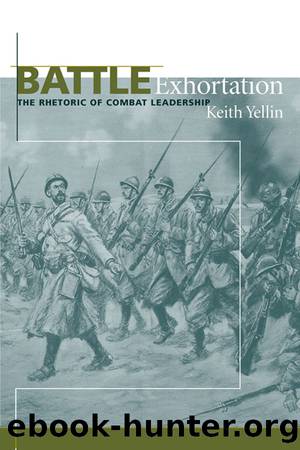Battle Exhortation by Yellin Keith;

Author:Yellin, Keith;
Language: eng
Format: epub
Publisher: University of South Carolina Press
Managing Violence in the Fifty-fourth Massachusetts
Carl von Clausewitz defined war as âan act of violence intended to compel our opposition to fulfill our will.â Submission of the enemy is the object, violence the means. He was not impressed by âself-imposed restrictionsâ to the violence of war, boundaries that today take the shape of rules of engagement (for specific operations) and the general law of war (the Hague Conventions and Geneva Conventions). For him, âWar is an act of violence pushed to its utmost bounds,â each side egging the other on, âwhich logically must lead to an extreme.â31 The advent of nuclear weapons has necessarily kept humanity from carrying war to its logical extreme, but even in Clausewitz's day, competent warfare required curbs to violence. Without checks, without tension, there would be neither enemy left to surrender nor captured treasure left to enjoy. Moreover, one's troops would not execute their mission smartly but operate as unrestrained savages, an incendiary mob. Spartan war songs and pipes, Plutarch reminded us, not only emboldened the scarlet-cloaked hoplites but guarded them against âexcessive rage.â32 With this sort of tension in mind, Garry Wills characterizes the psychological state that commanders must engender in troops prior to combat: âTo overcome combatants' inhibitions against facing death, against inflicting death, against massive violence, leaders must create a kind of psychic explosion in each soldier, but a controlled explosion. All the discipline of drill, uniforms, codes of conduct are meant to ignite and yet contain the forces that can keep up this unnatural psychic game of risk and wrath.â33 Where might we find an exemplar of violent ardor being carefully managed, a mix of spur and bridle? The Fifty-fourth Regiment of Massachusetts during the Civil War.
The Fifty-fourth Massachusetts is one of the Civil War's more famous regiments because its ranks comprised the first free black troops enlisted in the North, it was formed with great fanfare by the abolitionist establishment, and it faced dramatic challenges on and off the field. Fascinating personalities were involved: Frederick Douglass, as recruiter and father of two of the regiment's members; governor of Massachusetts John Andrew, official champion of the regiment and the principles behind it; Sergeant William Carney, remembered for his gallantry during the regiment's first major action; and Colonel Robert Gould Shaw, the regiment's young commanding officer, virtually deified in New England upon his death at the head of his unit. The 1989 motion picture Glory has helped educate modern audiences about the regiment. Its story, a microcosm of the nation struggling to become worthy of its philosophical principlesâcapped by a climactic battleâis well-suited for cinema.
The exhortative climax of the Fifty-fourth took place at the start of its climactic battle, the regiment's first major combat. Immediately prior to assaulting Fort Wagner, South Carolina, Colonel Shaw faced his men and urged, âNow I want you to prove yourselves men,â reminding them that âthe eyes of thousandsâ watched âthe night's work.â34 Without further appreciation of the context, besides battle being imminent and the Fifty-fourth being
Download
This site does not store any files on its server. We only index and link to content provided by other sites. Please contact the content providers to delete copyright contents if any and email us, we'll remove relevant links or contents immediately.
Cecilia; Or, Memoirs of an Heiress — Volume 1 by Fanny Burney(32042)
Cecilia; Or, Memoirs of an Heiress — Volume 3 by Fanny Burney(31447)
Cecilia; Or, Memoirs of an Heiress — Volume 2 by Fanny Burney(31398)
The Lost Art of Listening by Michael P. Nichols(7150)
We Need to Talk by Celeste Headlee(5406)
Asking the Right Questions: A Guide to Critical Thinking by M. Neil Browne & Stuart M. Keeley(5349)
On Writing A Memoir of the Craft by Stephen King(4655)
Dialogue by Robert McKee(4154)
Pre-Suasion: A Revolutionary Way to Influence and Persuade by Robert Cialdini(3967)
I Have Something to Say: Mastering the Art of Public Speaking in an Age of Disconnection by John Bowe(3774)
Elements of Style 2017 by Richard De A'Morelli(3233)
The Book of Human Emotions by Tiffany Watt Smith(3135)
Fluent Forever: How to Learn Any Language Fast and Never Forget It by Gabriel Wyner(2911)
Name Book, The: Over 10,000 Names--Their Meanings, Origins, and Spiritual Significance by Astoria Dorothy(2833)
Good Humor, Bad Taste: A Sociology of the Joke by Kuipers Giselinde(2821)
Why I Write by George Orwell(2771)
The Grammaring Guide to English Grammar with Exercises by Péter Simon(2644)
The Art Of Deception by Kevin Mitnick(2621)
Don't Sleep, There Are Snakes by Daniel L. Everett(2496)
